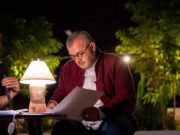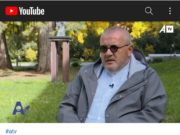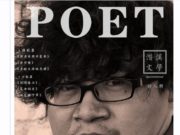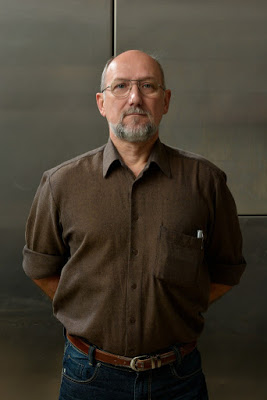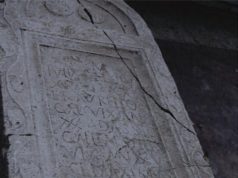Gustáv Murín (born April, 9th 1959 in Bratislava) published 39 books (7 of them in Czech, 1 in French, 1 in Hindí, 1 in Croatian, 1 in English, 1 Bulgarian, 1 Serbian and 1 Hungarian transl.): novels, novellas, books of non-fiction, collections of short stories, book of interviews with three famous comedians, biography of a famous Slovak chef, travel stories and essays. Received numerous literary awards incl. for most selling book of the year 2009 in Slovakia. Sale of his books reached together more than 130 000 copies. Published 24 E-books, 9 audio-books and 2 in Braille letters. Author´s almost 300 stories and articles have been translated into 49 languages and published in countries like Afghanistan, India, Croatia, Cyprus, France, Greenland, Taiwan, USA etc. Absolved readings and literary presentations in 69 cities of Slovakia and 27 countries of Europe, Asia and North America.
Well experienced as screenwriter, anchor and co-producent for TV, radio and off-theatre.
More in: http://gustavmurin.webgarden.cz/biography.
Text samples at: http://muringustav.blogspot.com.
Poetry and power
Essay about the role of the poets in transition periods of modern society
Poets have had from the very beginning of history needed to balance their relationship to political power. The struggle for freedom of expression date from ancient times. As an example we may use the fate of the poet Ovidius who was sentenced to exile till the end of his days by a Roman emperor. Later we may see the expulsion of the famous Russian poet Pushkin to exile in the Caucasus, though only temporarily, by the Tzar. And again on Italian soil we may find a completely different role of the poet, D´Anunzio, who dedicated his “heart and temperament” to the Fascist leader Mussolini and his fatal ideology. By the way, do you know that China communist leader was accepted as an author of a good poetry?
In our time we may find very interesting discrepancies in the role of the poets in modern society and consequently in politics. At the same time they are in one corner of the world tortured and killed, in another corner honored and in the third one completely ignored. Thus we may find three model-countries where we can significantly distinguish a different role for poets in society and particularly in the political scene. They are:
1. Countries with dictatorship or troubled fundamentalist political environment
2. Transition countries of Central and Eastern Europe plus Latin America
3. Democratic countries
Poetry against power
The best examples of all those three different roles for poets in society we may find in 90-ties all around the world. From the first type of the countries we may mention a few examples of this role (and very often fatal end) of poets in controversy with totalitarian and/or fundamentalist political environments. On the hand we have Case list of Writers in Prison of PEN International. This worldwide organization of poets, essayist and writers is focused on cases when poets are deprived of their human right of freedom of expression. Some examples from the early 1990s are:
Abkhazia
Sarion Khiguovič Tarkil – Editor-in-chief of “Amtsabz” magazine, published poet and member of Union of Writers of Abkhazia, reported by the North Caucasian Press Centre to have disappeared on the first day of arrival of Georgian troops in Abkhazia in August 1992. Said to have been in poor health at time of his disappearance.
Bangladesh
Begum Sufia Komal – Leading woman poet. Reported in October 1993 to be one of four writers threatened and persecuted by religious extremists for “hurting the religious beliefs of the majority of the people”. The Council of Soldiers of Islam, an armed Muslim group, called for her arrest at a meeting in Sylhet.
China
Liao Yiwu – Poet. Liao won a national poetry prize for his work in 1983/4, but his most famous poem is “Massacre”, finished after the Tiananmen Square massacre. It has never been published. One of five poets arrested in Chengdu, Sichuan providence, at the end of March 1990, in connection with a video of a poetry reading. He has created controversy before with his poem “City of death”, published in 1987 and accused by the authorities of been “too pessimistic”. Reported in March 1992 to have been sentenced to four years in prison for “counter-revolutionary propaganda”.
Cases like these mount into the hundreds every year and it is a sad history of struggle of poets for democracy. For their situation fits very well the words of Václav Havel who reminded us of the “radioactive effect of words” caused by “the incredible importance that unfettered words assume in totalitarian conditions”. Also Polish Nobel-laureate poet Czeslaw Milosz had mentioned: “When an entire community is struck by misfortune… poetry becomes as essential as bread.”
Poetry in power
The second model-country can be found in Central and Eastern Europe in 90-ties and later also in Latin America. In this type of country, democracy prevails and the role of poets suddenly changes.
In 1989 somebody said that for the Poles the fight to defeat communism lasted ten years. For the Hungarian ten months. For Eastern Germans ten weeks. And for Czechs and Slovaks ten days. Certainly not only the unknown author of this bon mot, but most of the people thinking about the collapse of communism in these countries would agree that in former Czechoslovakia the revolution was in the hands of intellectuals, mostly writers and poets. They played a significant role already in so called „Prague Spring“ in 1969 and they were first who suffer after defeat of the utopian idea of „socialism with human face“. They were leaders of dissent and they naturally were prepared to lead a revolution against the communist regime. And it actually happened. The so-called „Velvet Revolution“ started in theaters with proclamations to the public. The public listened and went to the streets to free not only the prisoners of regime as Bertold Brecht dreamed, but also the whole society. It is not surprising that the „Velvet Revolution“ tempted so many observers from abroad to the tempting conclusion that it was an excellent example of the qualities that only intellectuals could revitalize politics. The utopian vision of the intellectuals ruling the nation in perfect agreement with the majority of ordinary people seemed to be fulfilled in these days. First of all, the so-called „Velvet Revolution“ was really velvet. The Communists retreated willingly. Power was suddenly in the hands of writers, poets, actors and intellectuals generally. It all seemed like building a new home for everybody on a new green meadow.
The whole region became within a few years freed from totalitarian regimes and new democratic environment emerged. However, very interesting is how many writers took highest positions in their countries soon after revolutionary events – and how poorly they were able to use their power. In former republics of Soviet Union we may found similar examples. Zvjad Gamsachurdia was an excellent example of writer in dissent who, after coming to the power, turned dramatically into a dictator. It was the same in Armenia with Levon Ter Petrosjan. These are the cases when Presidents were really ruling the country. And in most of the cases they led their countries to bigger troubles and bad times.
All of the major political figures of recent Balkan conflicts (disintegration of Yugoslavia, Bosnia, Kosovo) had roots in literature – Tudjman (Croatia), Izetbegovič (Bosnia), Karadžič (Bosnia), Miloševič (Serbia) etc. As an example we may mentioned Radovan Karadžič who gained his reputation as a poet, but now is accused of war crimes.
In some Central and Eastern European states the Presidency is generally a more symbolical role and does not have as much to do with practical politics. Consequently in such a position, a writer could do less damage in practical matters and show a better face. In the 1990s we found several successful Presidents in Central Europe and Baltic States. The most famous example was Václav Havel as President of the Czech Republic; others were the former President of Hungary, Arpád Göncz, and the former President of Bulgaria, Zhelju Zheljev. It was the same in Estonia with President Lennart Meri and to some extent with former President of the Slovak Republic Rudolf Schuster.
In fact poetry still played a significant (although symbolic) role even in politics of Central and Eastern Europe. This was particularly visible in that time political turmoil in the Ukraine. It started with accusation of Ukrainian president Kutchma of ordering the murder of a journalist critical of the regime. The largest demonstration since the proclamation of Ukraine as an independent state took thousands of protesters to the monumental statue of the nation’s most respected poet, Taras Schevchenko, in Kiev on March 9, 2001, (the day of Schevchenko`s birthday that is recognized as one of the most important national celebration days) to try to prevent the attempt of president Kutchma to pay tribute by laying flowers in front of the statue of poet.
Poetry without power
In the third model-country we may find long-time stabile democratic environments and thus no any threat to writers and poets at all. And here we may found also a paradoxical situation. It was best described by Ryszard Kapuściñski, the great Polish war correspondent and one of most articulate eye-witnesses of revolutions in the Third World. At the workshop “Literary reportage – Facing the Challenge of the 21st Century” in 1999 in Warsaw he remarked: “At the beginning of this century, writers were able to take major roles in revolutionary events, but within fifty years their medium had been practically eclipsed by mass communications such as radio. Television later pushed radio to the same marginal status, while writers themselves occupy an increasingly narrow edge of that margin today.”
For example American writers and poets were in the past also involved in political turbulence. As an example we may mention the investigation of 16 writers (including Arthur Miller) during the McCarthy era in 50-ties of last century. The whole Beat Generation (Ferlinghetti, Ginsberg, Kerouac etc.) in the 1960s was more or less involved in political turbulences. It was that time when poet Lawrence Ferlinghetti proclaimed: “The society of alienation has no place in history. We are going to create a brave new world!”
But where is that brave new world now? It is interesting how intellectual revolt can vanish within a few years. Nowadays, teenagers who had played an active role in 60-ties, are leading corps of consumption society!
Yes, there was a time when American writers and poets took their role seriously. As Kurt Vonnegut Jr., wrote: “I was thinking why write books when presidents, senators and generals are not reading. I suppose that we have to catch them before they become generals, senators and presidents and poison their brains with humanity.” Well, is this ambition plan still valid when nowadays even non-presidents, non-senators and non-generals are not reading? Already in year 1999 the biggest book market in the world, the United States, sold more videogames than books. No wonder that the American writer Ethan Canin, a teacher at the Iowa University Writers’ Workshop, complained: “Books were once king, but now movies are king, books are sort of ignored. Writers nowadays are more and more forced to seek out little islands for themselves.”
In global perspective it was also outlined by London-based author of Indian descent V.S. Naipaul who won the Nobel prize for literature in 2001: “Literature is on the verge of extinction. The idea no longer carries any weight. Literature is being pushed away in
favor of wizards and other such creatures.” The Nobel laureate was apparently referring to fellow British author J.K. Rowling´s popular Harry Potter series during his address at the opening ceremony of the 16th World Book Fair in New Delhi.
With poetry it is not better. When freedom of expression is fully applied in democratic society, you do not need to write in codes and metaphors. And when metaphors are not needed for what is poetry good?
Questions instead of conclusions
It is expected that first model-countries may sooner or later follow the second model. Than the formerly threatened poets become respected subjects as a result of current political changes. However, modern society will not stand still because of our hopes and good wishes. At the beginning of the 21st century we are witnesses to a shift in the role of poets in second model-countries to the role of those in third model-countries. In Central and Eastern Europe writers and poets in the highest political ranks from the 1990s have been replaced by far more pragmatic leaders. Consequently, it seems that with the progress of modern society the value of the written word is declining, especially in the context of the modern political scene. And this situation provokes the following questions – is this tendency a global one? Will we see in the near future the end of the role of writers and poets in politics? Or is there a possibility that by losing their position in national politics poets become speakers to a larger, global audience?
Whatever the case, we may count our times as very interesting and important as well. Poets and politics, phenomenon that was a feature of human history for thousands of years is changing rapidly – but which way?
Gustáv Murín



